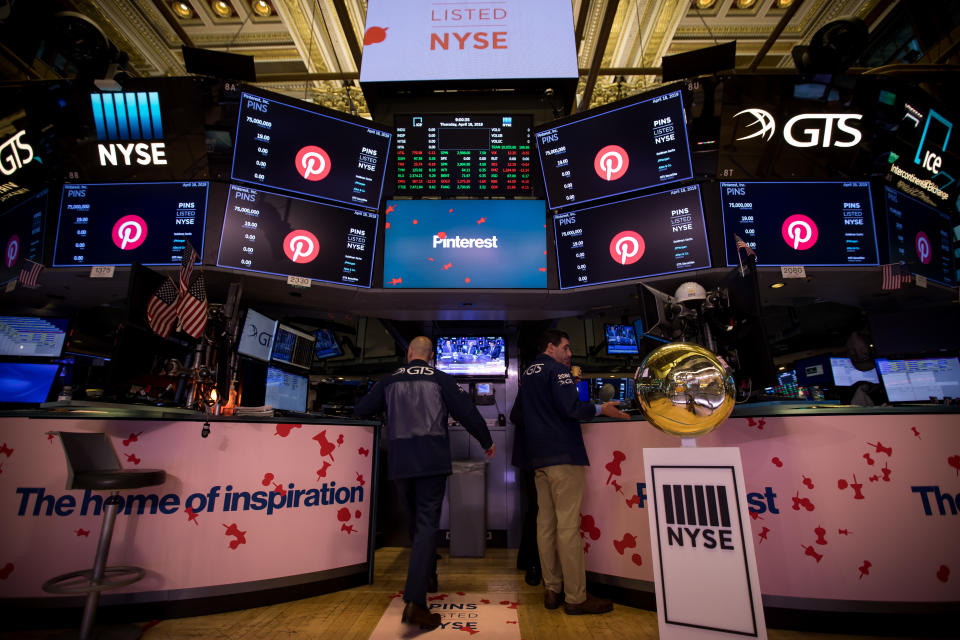Why the Zoom and Pinterest IPOs could reverse a relative decline in tech valuations
With Lyft shares suffering a 30% decline since trading on the public market and Pinterest initially indicating shares in the company could have been priced below where they were valued in its last private fundraising round, investors questioning sentiment surrounding initial public offerings got some relief Thursday.
Video conferencing provider Zoom and scrapbooking site Pinterest, which both priced shares above their respective initially indicated price ranges, debuted to healthy pops after seeing their shares listed on public markets. Zoom shares jumped 80.5% above its IPO price, while Pinterest shares opened 25% above its IPO price in their debuts Thursday morning.
But does that mean the image of strong investor demand for new tech companies has been restored? Not necessarily.
In the shadow of Lyft’s weak debut, remember just over a week ago that Pinterest initially set its indicated price range at $15-17 per share for its 75 million-share offering, setting it up to be valued below its last $12 billion private valuation achieved in 2017.

While Pinterest eventually saw its public valuation come in slightly above that at $12.7 billion, the trend of tech companies seeing public investors value them at larger so-called “step-up” valuations had already been diminishing. According to PitchBook data compiled for Yahoo Finance, global venture-backed tech companies’ step-up valuations were tracking for a 13-year low. Before the Zoom and Pinterest IPOs, tech companies going public in 2019 had only seen a median step-up valuation reach 1.36-times as large as prior private valuations.
But with only about 10 IPOs so far in PitchBook’s 2019 dataset, experts who have advised companies through the public offering process caution that it might be too early to draw any conclusions one way or the other. Not to mention, companies going public don’t always do so at the same stage in maturity, or after the same amount of time after their last private fundraising round.
“For a company that’s not in its same stage of profitability, your step-up by definition is going to be smaller,” said David Ethridge, U.S. IPO services leader at PwC. Pinterest, for its part, has yet to reach profitability, while Zoom reported a $269.5 million gross profit in its latest fiscal year. That may have helped the company reach a valuation of roughly $9 billion in its IPO, which is more than nine-times its last private valuation in a 2017 fundraising round.

A step-up valuation as large as Zoom’s would do much to lift the average seen so far in 2019, but Ethridge contends that it might not influence companies that are waiting in the wings and contemplating IPOs of their own.
“One of the last things they might be looking at in terms of a go, no-go decision for going out is not how they compare to their last round,” he said. “I think for sure when you’re talking about companies in the same sector, one company’s performance can affect another in the frame of sentiment because you’re selling a similar product to the same shareholders.”
Lyft’s poor performance since its IPO, for example, has already weighed on Uber’s public prospects. Earlier reports indicated the banks underwriting Uber’s IPO had floated valuations of around $120 billion for the ride-hailing company, but that range has reportedly since fallen to around $90 billion to $100 billion.
Companies are just staying private longer
But the trend of smaller step-up valuations might be influenced by more than just investor sentiment or competitor comparisons, according to Deloitte partner Barrett Daniels, who advises companies through IPOs. He notes a large part of declining step-ups could just be a factor of companies getting larger by staying private for longer.
“Because of the abundance of capital available to these companies, they’ve been able to achieve bigger valuations relative to the past,” he said. “These big ones that most people talk about, they don’t need to beg for money. Money is just thrown at them. The way funds come to them has changed over the last 10 years. It’s just a different world.”
That being said, Daniels noted that startups that have boosted their funding positions through private funding might hold off if other companies suffer a similar fate as Lyft’s 30% decline.
“Certainly the first few out of the gate do set the stage for the rest of the year. You can easily look back to 2017, that didn’t start out great and [the deal flow] never really recovered,” he said.
Zack Guzman is the host of YFi PM as well as a senior writer and on-air reporter covering entrepreneurship, startups, and breaking news at Yahoo Finance. Follow him on Twitter @zGuz.
Read more
Lyft's valuation nearly doubled to $30 billion in 9 months. Here's why that's not crazy
Why 2019’s IPO outlook is bleaker than it should be
Juul surpasses Facebook as fastest startup to reach decacorn status
